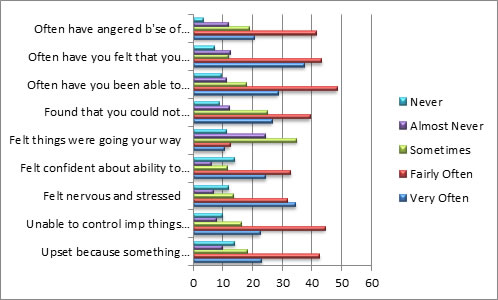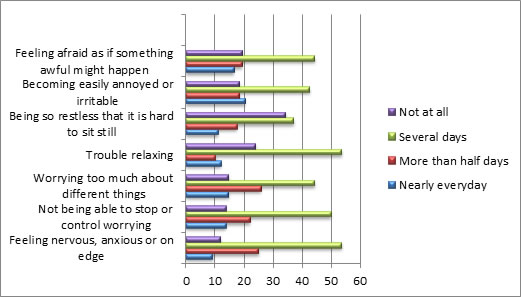|
Table of Content - Volume 21 Issue 1 - January 2022
Level of stress and anxiety among first year MBBS students: An online survey study
Neelam Patil1*, Vibha Sakhare2, Alka Nerurkar3
1Associate Professor, Department of Biochemistry, TNMC & BYL Nair, Ch Hospital, Mumbai, Maharashtra, INDIA. 2SR, Department of Biochemistry, AIIMS, Nagpur, Maharashtra, INDIA. 3Professor & HOD, Department of Biochemistry, TNMC & BYL Nair, Ch Hospital, Mumbai, Maharashtra, INDIA. Email: neelamb99@gmail.com
Abstract Objective: Since December 2019, the COVID-19 pandemic had posed a substantial threat with its associated high mortality, infection, and risk of psychological stress. A large number of students were affected because of a prolonged break from academic activities and staying at home. The focus of this study is to understand the stress levels of Indian students, any psychological imbalances, and their major hurdles during the COVID-19 lockdown. Methods: Using a questionnaire, survey was conducted among first year MBBS Students of a medical college. Along with their demographic details, the participants also reported the challenges faced during this period. The statistical scores for the responses were calculated and the demographic variables analysed. Results: We observed that students were generally stressed and faced anxiety during lockdown and the pandemic. Conclusion: During this period, students’ mental health was required to be continually monitored as they were stressed due to concern regarding their studies and future careers. Key Words: Anxiety; Stress; Questionnaire.
INTRODUCTION The first outbreak of the novel coronavirus diseases (COVID-19) was reported at the end of December 2019 in Wuhan, China and rapidly the virus spread globally; on March 11, 2020, the World Health Organization declared a pandemic state1. The transmission of COVID-19 cases in India started to increase in the second week of March 2020. Therefore, to prevent community spread of the infection the Government of India announced a complete lockdown from 25 March 2020 which was extended to 31 May 2020 restricting the movement of the entire population in India. During this period, all academic institutes including medical colleges were completely closed. University students, compared to the general public, have been found to be more susceptible to the unfavourable effects of the quarantine.2 Mental health disorders are always a topic of concern among youth, and their incidence has been increasing significantly worldwide. According to a World Health Organization report published in 2008, 1 in every 5 adults had experienced mental health disorders in the past year. However, the COVID-19 pandemic triggered an even more rapid increase in mental disorders among adults. Medical students are known to experience high-stress levels which can disturb physical and mental health, which in many cases progresses to cause anxiety or depression. Also many factors influence the psychological state such as personality traits, sex, believes, and socioeconomic status. Also medical students are subject to academic and non-academic aggravating factors that might predispose them to psychological distress. Academic factors include having problems in understanding the curriculum, reading from new extensive textbooks, long studying hours, irregular schedules, high study load, frequent exams, high sense of competition with others, and doubts about academic performance. Non- academic factors include financial stress, high familial expectations, also fear of future failure in the medical career.(3) Fear of the COVID-19 pandemic is a global issue and causes significant mental health problems, especially among medical students due to the nature of their lifestyle. The experience of online learning adds to the existent stress, especially as medical students’ self-confidence decreases amid fears of lacking the essential clinical skills that are usually gained during hospital training. In addition, the stress is increased by fears of being at more risk of getting infected with COVID-19 or spreading the infection to their beloved ones. Continuous feelings of fear result in deterioration of study and work performances. With this background this study was undertaken to understand the impact of the COVID-19 pandemic on Indian students’ mental health, as in level of stress and anxiety.
MATERIALS AND METHODS Study Type: Educational Research Study Design: Observational Study This web-based observational study was conducted between August 2020 and October 2020. The survey questions were selected based on the available literature and were validated by senior faculty members with more than ten years of teaching experience. Sample Size: 150 Students of Phase I MBBS. Sampling Method: Convenient Sampling. Enrolment: Voluntary Inclusion criteria: 150 students whose written consent will be taken. Exclusion criteria: Students not giving consent. Students remaining absent. MATERIALS AND METHODS: For this study, web-based questionnaire was developed using Google Forms. The form contained two sections, namely, a sociodemographic section and a psychometric section; the latter assessed the psychological and behavioural impacts of the COVID-19 pandemic specifically stress and anxiety.(4) Distribution of the Questionnaire: The Google form was distributed to the students through various social media platforms, such as WhatsApp, E-mail and Telegram. The students were invited to participate in the survey by filling in the Google form with twenty four hours timeline. Also, the Google feature that limits each respondent to one submission eliminated multiple responses. Statistical Analysis: All the data were recorded in Excel (Microsoft Corporation) and assessed for accuracy. The summary of responses was depicted in a pie chart on Google forms. The statistical analysis was completed using SPSS, version 25.
OBSERVATION Sociodemographic Characteristics Among the 150 respondents, slightly more male students (91, 60.2%) participated than female students (59, 39.8%). Of the 150 participants, most were in the age group of 19-20 years.
Chart 1: Questionnaire regarding level of stress- Chart 2: Questionnaire regarding level of anxiety
DISCUSSION This study was meant to address the impact of COVID-19 on mental health and wellbeing among undergraduate students of first year MBBS. As public health emergencies have many psychological effects, the levels of anxiety stress and other mental health problems are on rise since the declaration of COVID-19 as a pandemic. In our study students were asked to rate their level of stress with regard to the current COVID-19 pandemic on a 5-point scale, ranging from 0=‘never’ to 5=‘very often’ (Bar Chart 1).Majority of respondents reported stress at moderate or higher levels. Nearly 60% of respondents stated that they have been upset because of something that happened unexpectedly, were unable to control the important things in life “very often”. Also nearly 58% reported they felt nervous and stressed “Fairly often”. Also students were asked to rate their level of anxiety on a 5-point scale, ranging from 0=‘not at all’ to 5=‘nearly every day’(Bar Chart 2).Nearly 58% respondents stated that they felt nervous, anxious or on edge, unable to stop or control worrying and have trouble relaxing “on several days”. Also nearly 61% reported feeling afraid as if something awful might happen “more than half the days”. This study shows an increasing magnitude of stress and anxiety in undergraduate students of first year MBBS during pandemic. A recent systematic review showed the undergraduate students as ‘fragile population’, recommending urgent primary preventative measures such as screening and educational programmes5 Results of this study provide further confirmation, in that the majority of medical students surveyed experienced moderate or higher levels of psychological distress. It is likely that the COVID-19 pandemic has contributed to their level of stress. Certain studies have focused on developing mechanisms to reduce the negative mental health outcomes related to healthcare emergencies. One such strategy centres on the development of strength so as to increase ability to mentally or emotionally cope with a crisis.6,7 Hence presently steps to improve students’ mental wellbeing are important issues. It is becoming a significant priority to protect them from the consequences of mental disorders and reduce negative effects of the pandemic.
CONCLUSION The study has provided insight into the impact of the COVID-19 pandemic on mental wellbeing specifically stress and anxiety levels. Hence it is recommended that measures should be taken to reduce students’ stress and anxiety which might have harmful effects in many aspects.
STUDY LIMITATIONS The objective responses of the participants to the survey questioners are based on their perceptions and COVID 19 experiences. Depression and anxiety disorders diagnosis need direct individual clinical assessment.
REFERENCES
Policy for Articles with Open Access
|
|
 Home
Home


